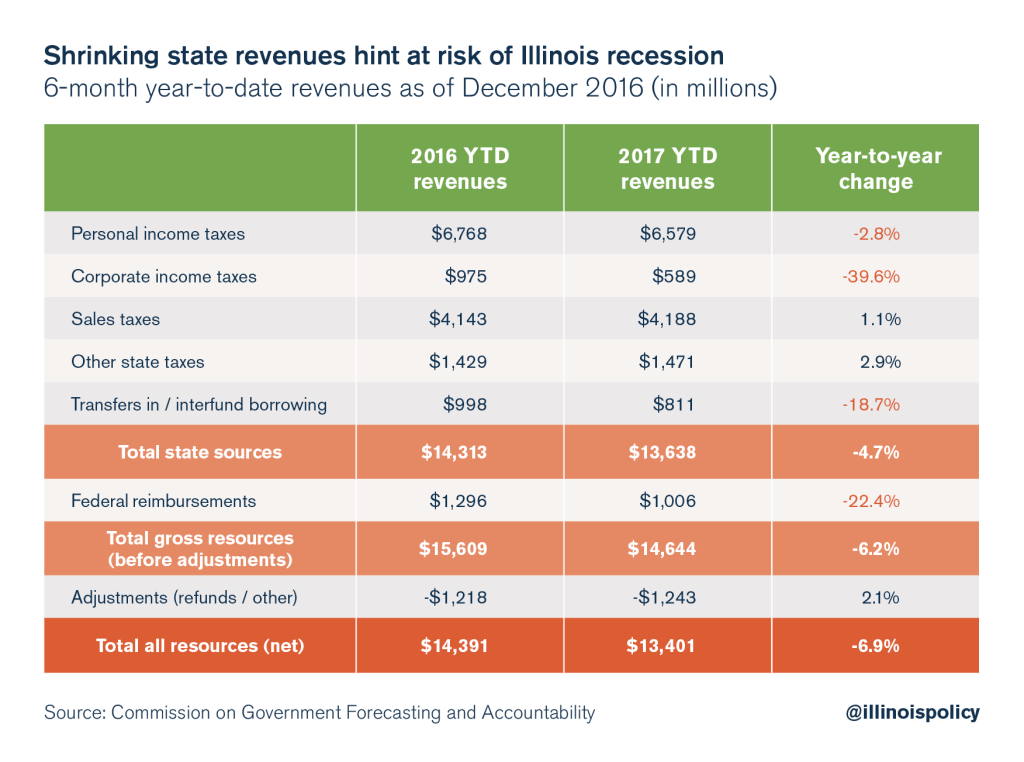Illinois edges toward recession, politicians propose multibillion-dollar tax hike
Despite declining tax revenues and warning signs of a possible recession, Illinois lawmakers in Springfield are mulling tax hikes.
One of the most foolish things politicians can do to an economy suffering from a weak recovery and a shrinking tax base is to pass tax hikes. Hitting residents and businesses when they’re struggling risks sending a faltering economy into a tailspin.
And for an economy edging toward recession, tax hikes are even worse.
Unfortunately, a multibillion-dollar tax hike is exactly what Illinois politicians are proposing for a state economy that’s been remarkably weak and is now showing signs of recession-like shrinkage.
Illinois’ falling tax collections hint at looming recession
According to the December 2016 monthly briefing from the Commission on Government Forecasting and Accountability, or COGFA, Illinois’ corporate income tax collections are down $386 million in the first six months of fiscal year 2017, when compared with the same time last year.
Personal income tax revenues are off by $189 million. And sales tax collections are also weak, up only $45 million.
State revenues are down by nearly 5 percent year to date, and when all sources are taken into account, total revenues are down nearly 7 percent.
The drop in Illinois’ revenues is occurring despite record stock market returns, a nine-year low in the national unemployment rate and a relatively healthy U.S. economy.
COGFA sums it up this way: “To date the state has experienced across the board revenue weakness. The most closely economically-tied major sources are experiencing levels of weakness not seen since the last recession.”

Illinois’ falling tax revenues reflect the declining health of the state’s tax base, which has been steadily shrinking as the state’s anti-growth economic policies and repeated fiscal crises have worsened, giving rise to accelerating out-migration in recent years.
What’s behind Illinois’ falling tax revenues and declining state population?
Excessive and ill-conceived regulations. Government spending squeezing out the private sector. A $130 billion pension crisis. Nearly 7,000 units of local government, which drives up Illinois property taxes. The nation’s highest property taxes. One of the nation’s heaviest tax burdens on businesses. Sky-high workers comp costs. A collapsing manufacturing base. All these serve to push Illinois residents and businesses out, destroying the state’s tax base.
In light of these factors, the Illinois Senate’s budget plan is especially wrongheaded. Senate President John Cullerton and Senate Minority Leader Christine Radogno are pushing a plan that punishes taxpayers with more than $5 billion in additional taxes, $7 billion in borrowing and a $200 million bailout of CPS, but includes virtually nothing in structural spending or economic reforms.
In short, Illinois politicians are pursuing very short-term tax revenue gains at the expense of economic and population losses.
Hiking taxes in a faltering Illinois economy is a bad idea. Here’s why:
- Out-migration is already doing major damage to Illinois’ economy and its tax base. Illinois has already lost a net of more than 1.2 million residents since 2000, and they’ve taken more than $40 billion in taxable income with them. Tax hikes will only accelerate the outflow. A recent poll by the Paul Simon Public Policy Institute found that 47 percent of Illinoisans polled said they want to leave the state. Their number one reason? Taxes.
- Illinoisans already face one highest total tax burdens in the country, including the highest property taxes in the nation. The proposed tax hike will ensure Illinois is a top five state when it comes to taxing its residents.
- Illinois hasn’t created any net new jobs since the year 2000. Multibillion-dollar tax hikes and no serious reform will give little incentive for companies to stay in Illinois or for new ones to set up shop here.
- The state’s manufacturing base is already shrinking. Downstate communities are suffering from fewer jobs and fewer opportunities. Higher taxes will accelerate those communities’ decline.
Most importantly, higher taxes will only delay the implementation of the real reforms Illinois desperately needs – from 401(k)-style retirement plans to comprehensive property tax reform to revamped workers’ compensation, collective bargaining and Medicaid. Once billions in additional dollars flow to Springfield, any pressure on politicians to enact reforms evaporates, which is exactly what happened with the 2011 tax hike.
A tax hike won’t solve the state’s problems. It will only perpetuate them – and possibly send the economy into a nosedive.

